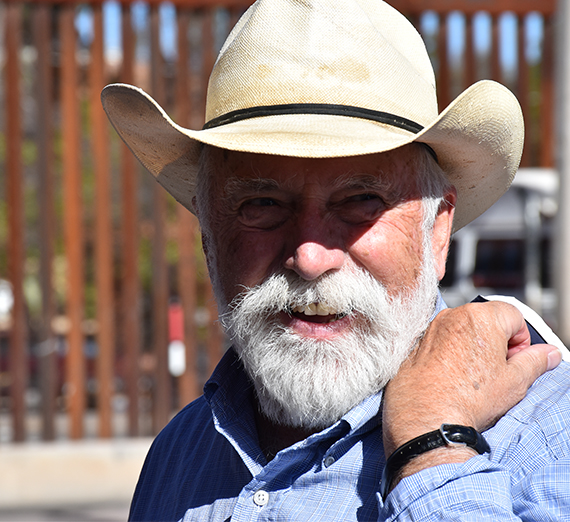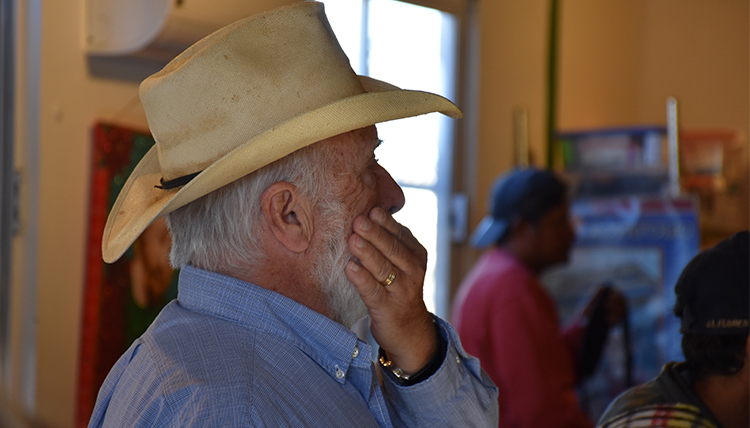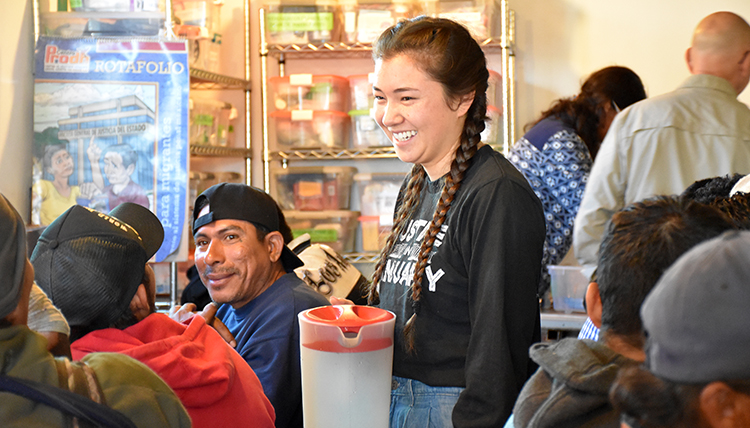Justice in January: A Jesuit Experience

By Analee Scott (’18)
International Relations & Spanish major
Father Pete Neeley, S.J. stands at about 5'10" if you include his trademark cowboy hat we only ever saw come off once—during grace. His wide, scruffy smile and bright, playful eyes greeted us at 8 a.m. sharp one chilly morning in the Kino Border Initiative (KBI) house. As our border-crossing, Nogales-Sonora guide that day, he quickly directed us into the vans and we were on our way, wasting no time.
"So you speak Spanish, Fr. Neeley?" we asked him in the car, uncertain of how this would work if he didn't.
"Well, I've picked up a few things in the last 30 years, you know."
Thirty years. For 30 years, Fr. Neeley has immersed himself in Latin American culture, taking assignments in México, East L.A. and Central America. For the last several years, he has dedicated himself to the service of migrants at the border near Nogales, Arizona and Nogales, México.
As he walked us across the border into México, it was evident that he was a beloved, well-known member of the community that had grown with and walked alongside nearly every person we passed: venders, shop-keepers, restaurant-owners, residents. "Padre, padre!" they would call out as we passed, dropping whatever they were doing to come embrace him and "platicar" (chit chat) for a minute. Spanish rolled off his tongue with ease, perfectly tuned to the local rhythm, and the genuineness of his relationships in the town spoke for itself.

When we reached El Comedor (The Cafeteria), a KBI resource for recent deportees from the US just on the México side of the border, Fr. Neeley spent a minute platicando with two guys just outside before leading us in. We climbed a few stairs up to a humble room with a concrete floor, a number of long tables and benches and a small closed-off kitchen in one corner. Volunteers with nametags, aprons and big smiles bustled about and started delegating jobs to us: “You two, grab pitchers of coffee and start serving.” “You three, start breaking those buñuelos in half.” “You two, welcome people at the door.” People started filing in and before we knew it, the benches were full and the air was alive with chatter.
Although we did serve food and refill drinks, we spent the majority of the time spread among the breakfast guests, listening to their stories and sharing our own as they ate. Sister Alicia, one of the head volunteers at El Comedor, led everyone in fun, simple hand games that took us back to childhood and got everyone laughing. She passed the microphone down one table and asked people to answer the simple question, “¿Cómo se siente?” (“How do you feel?”) “Comfortable,” “full” and “welcome” were some answers given. It was in that space that, perhaps for the first time in a long time, these migrants were being treated as more than criminals, more than aliens, more than “illegal.” Though far from where they probably wished to be—with family members, at a job, in a hospital—at least they were in a place where they were welcomed warmly, fed a hot meal and offered practical resources like clothing, bus passes, help with paperwork, a telephone.
As plates emptied, Sister Alicia asked for volunteers from the benches to help wash dishes and hands flew up—Mexican hands, Guatemalan hands, Salvadoran hands, Honduran hands. Fr. Neeley later explained to us that everything about El Comedor is about togetherness. It isn’t about these volunteers and those migrants in need; if everyone has dignity and if you’re truly working for the common good, everyone contributes and everyone benefits.
As I reflected on this message, I was reminded of the words of Lilla Watson, an Aboriginal activist and educator from Australia:
“If you have come here to help me, you are wasting your time. But if you have come because your liberation is bound up with mine, then let us work together.”

In Fr. Neeley and El Comedor, I witnessed an embodiment of the Jesuit mission we discuss so much—the mission to be completely with a people, to legitimately go from "us and them" to "we." He did not simply read up on immigration legislation, study social factors and analyze statistics; he went and lived life alongside the people stuck in the push-and-pull politics of the borderland, staying by their sides through the decades, calling Nogales his own home.
This was what the Justice-in-January trip meant to me. It was expanding my narrow frame of reference through personal experiences that helped me Humanize, Accompany and Complicate an issue like immigration. It was walking through Nogales-Sonora on Fr. Neeley's heels, entering the sacred space of El Comedor, finding a seat between a man from El Salvador and a man from Honduras with distinct and grueling and beautiful narratives, and reorienting my mind around the concept of one of Gonzaga’s favorite words: “community.” It was going to the borderland and being there to listen to people's stories and share my own, to expand my "we" just a little bit more so that thirty years down the road, I, too, can truly be with people.
Thank you, Fr. Neeley; thank you, KBI; thank you, migrants, for teaching me what it means to truly be with people. I know our paths, inextricably linked, will cross again.
Read more student reflections:
